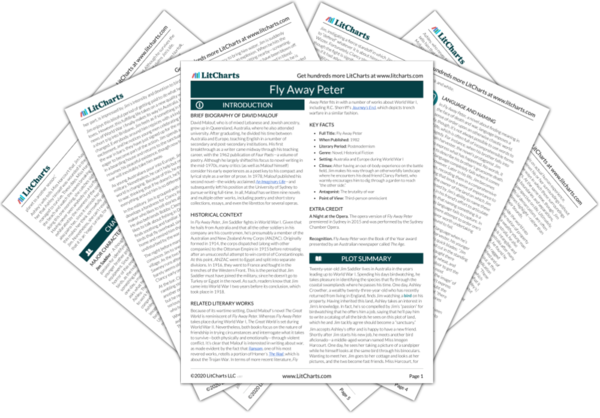When Jim watches Bert’s biplane roar through the sky at the beginning of the book, he resents its noisiness and its imposition, for he feels that this machine has encroached upon the territory of the birds he so admires. This immediately establishes a sort of tension between the natural world and the technological advancements that the plane represents. Jim is suspicious of these advances, noting that planes are “new toys of a boyish but innocent adventuring,” but they have already “changed their nature and become weapons,” since the military has started using them as part of a “new fighting arm” in World War I. Because of this sudden change in use, Bert’s biplane—and planes in general—take on a new significance in Fly Away Peter, representing the rapid changes that are inspired by the war and constantly unfolding around Jim.
Bert’s Biplane Quotes in Fly Away Peter
It was a new presence here and it made Jim Saddler uneasy. He watched it out of the corner of his eye and resented its bulk, the lack of purpose in its appearance and disappearance at the tree line, the lack of pattern in its lumbering passes, and the noise it made, which was also a disturbance and new.

Unlock explanations and citation info for this and every other Fly Away Peter quote.
Plus so much more...
Get LitCharts A+He had a map of all this clearly in his head, as if in every moment of lying here flat on his belly watching some patch of it for a change of shape or colour that would be a small body betraying itself, he were also seeing it from high up, like the hawk, or that fellow in his flying-machine. He moved always on these two levels, through these two worlds: the flat world of individual grassblades, seen so close up that they blurred, where the ground-feeders darted about striking at worms, and the long view in which all this part of the country was laid out like a relief-map in the Shire Office—surf, beach, swampland, wet paddocks, dry, forested hill-slopes, jagged blue peaks. Each section of it supported its own birdlife; the territorial borders of each kind were laid out there, invisible but clear, which the birds were free to cross but didn’t; they stayed for the most part within strict limits. They stayed.
Jim regarded it in a spirit of superstitious dread; and in fact these machines too, in the last months, had entered a new dimension. After just a few seasons of gliding over the hills casting unusual shadows and occasionally clipping the tops of trees, new toys of a boyish but innocent adventuring, they had changed their nature and become weapons. Already they were being used to drop bombs and had been organized, in Europe, into a new fighting arm.
[…] he was out of himself and floating, seeing the scene from high up as it might look from Bert’s bi-plane, remote and silent. Perhaps he had, in some part of himself, taken on the nature of a bird; though it was with a human eye that he saw, and his body, still entirely his own, was lumbering along below, clearly perceptible as it leapt over potholes and stumbled past clods, in a breathless dream of black hail striking all about him and bodies springing backward or falling slowly from his side. There were no changes.
He saw it all, and himself a distant, slow-moving figure within it: […] the new and the old dead; his own life neither more nor less important than the rest, even in his own vision of the thing, but unique because it was his head that contained it and in his view that all these balanced lives for a moment existed: the men going about their strange business of killing and being killed, but also the rats, the woodlice under logs, a snail that might be climbing up a stalk, quite deaf to the sounds of battle, an odd bird or two […]












